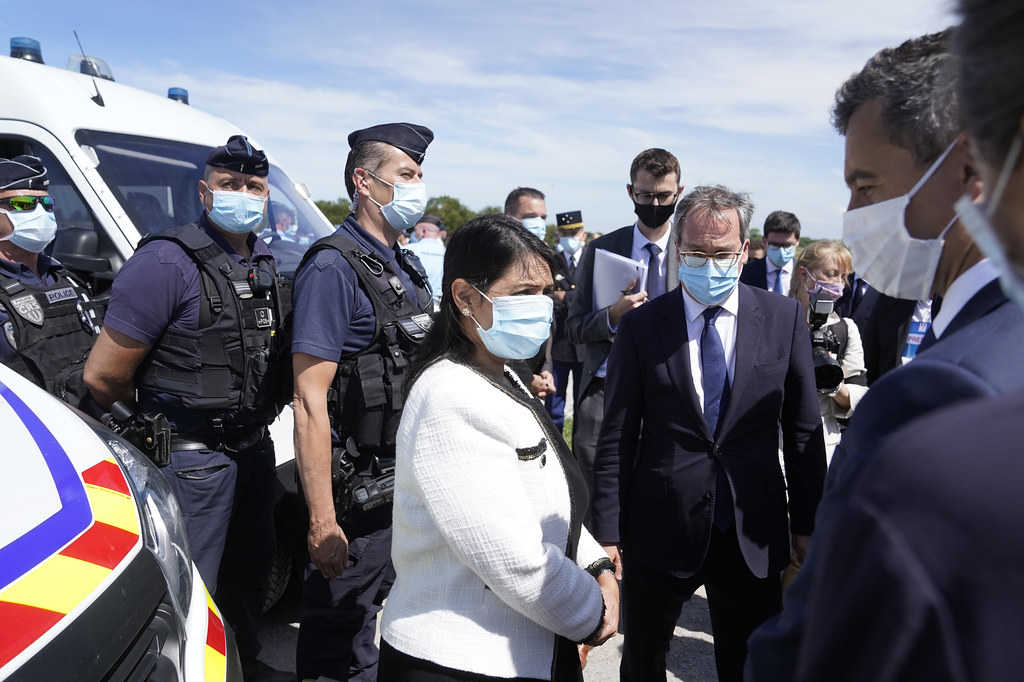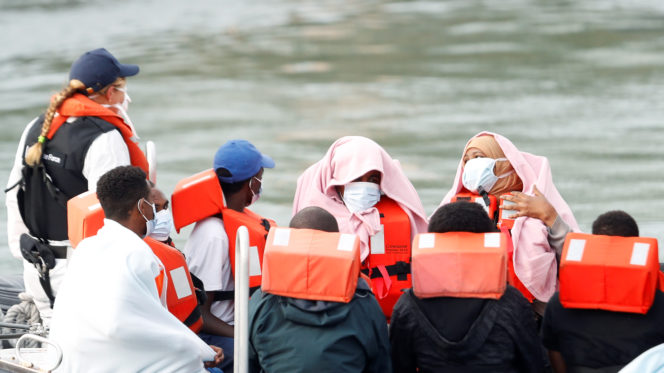The Navy Wants Nothing to Do With the Tories’ War on Migrants
When the going gets tough, the Tories get tough on migrants.
by Daniel Sohege
18 January 2022

The Home Office announced yesterday that it plans to recruit the royal navy to help enact a controversial policy of ‘pushing back’ refugee dinghies in the Channel using naval warships. But, as has come to be typical of Boris Johnson’s government, the move is all smoke and mirrors with no real potential for practical application.
Senior naval officials, including chief of the defence staff admiral sir Tony Radakin, have condemned the plans, saying that the navy will not engage in pushbacks or operations which would put lives at risk.
The Tories know this. But they’re not announcing this kind of wildly inflammatory, authoritarian policy with the intention of actually implementing it; it is merely another ploy to distract us from the government’s mounting catalogue of scandals and failures.
It is obviously illegal.
The government’s plan to militarise the Channel against migrants doesn’t just put lives at risk, it contravenes multiple international laws. Under maritime law, seafarers – whether they’re in the navy or the Royal National Lifeboat Institution (RNLI), which usually patrols the Channel – are obligated to rescue people in danger at sea – whether they want to or not. Of course, despite the government’s hostile position, plenty of them do actually want to. As navy veteran Loz Argyle tweeted: “I’ve been involved in rescuing migrants/refugees all over the world, we get a sense of pride in rescuing people, I’m so fucking offended by this fucking despicable govt.”
I’m a proud Royal Navy vet and i can tell you now we would never ever leave migrants to drown in the sea, I’ve been involved in rescuing migrants/refugees all over the world, we get a sense of pride in rescuing people, I’m so fucking offended by this fucking despicable govt…
— Loz Argyle ⚓ (@ArgyleLoz) January 17, 2022
There’s also the not insignificant matter of individuals seeking asylum themselves. Masters of vessels do not necessarily have the power to grant asylum. However, if someone makes it clear that they are seeking asylum, it falls to the government of the area in which they are rescued to take primary responsibility for ensuring that they are provided with safety.
This does not mean that the individual is automatically granted asylum, but it does mean that it becomes a whole lot more complicated for the government to just send them back into someone else’s territory. It is a cardinal obligation enshrined in international law that nation-states have a duty to actively secure the fundamental human rights of those in their territory, including at sea.
Given this context, it’s fairly obvious that the royal navy is not going to be using warships to force small dinghies back into French waters anytime soon – aside from anything else, it is completely impractical to think they could, and would almost certainly put the small boats, and those onboard them, at greater risk of being lost under the cold waters of the Channel.
That is what makes the current plans so ludicrous. Sure, they may sound tough, and probably play well to a certain section of the electorate, but in reality, unless the UK government is going to actively say that the navy should cause the deaths of innocent civilians in its own waters, they have no practical purpose.
The government has other motives.
While international refugee law is open to debate at times – it is constantly being clarified by legal cases – there are some areas where it is remarkably consistent: a refugee has the right to cross more than one country in their attempt to seek asylum; a refugee cannot, and must not, be penalised for their manner of entry; a person or institution must not deliberately cause the loss of life of refugees.
The government, despite its repeated claims to the contrary, has to know this – along with the fact that a lot of the measures it continues to propose and advocate for are illegal. Even discounting the expertise of its own extremely capable legal team, the multitude of interventions by legal experts and refugee organisations, including the United Nations High Commissioner for Refugees would ensure that it is aware of these laws.
That said, whether the government is legally able to enact its latest immigration policy is beside the point. Yesterday’s policy announcement is part of a broader trend of the Tories ‘punching down’ at refugees to distract from the many failings within the party – a tactic the party has deployed for decades. It should come as no surprise that since the revelations of illegal parties at Downing Street earlier in the pandemic have come to light, they have upped their attacks against asylum seekers.
A clear & refreshing response from @ArgyleLoz to our opportunistic & increasingly authoritarian Govt’s unhinged populist abuse of the Royal Navy by using them as a distraction from the Govt’s catastrophic failures, unethical rule-breaking, & relentless lies.#DowningStreetParty https://t.co/5RkBlQ4BzZ
— GET A GRIP (@docrussjackson) January 17, 2022
Proposing harsh immigration policies allows the Tories to look tough and appeal to their increasingly angry and disillusioned voter base, without actually having to enact anything serious or workable. In this context, the legal experts and charities that condemn the plans actually end up being used to the Tories’ advantage, who accuse these “activist lawyers” and “do-gooders” – to use home secretary Priti Patel’s own words – of thwarting the government’s ‘noble’ attempts to ‘protect’ the country.
There are lots of ways the Tories could reduce Channel crossings.
While there’s no doubt that the Tories’ arguments against migrant crossings are morally reprehensible, given that the Channel is one of the busiest shipping routes in the world – and thus extremely dangerous – it is important that we find safer, alternative routes for asylum seekers to take to the UK.
you know what *would* reduce channel crossings?
safe and feasible routes. https://t.co/xp7iUuWc3J
— Ben Smoke (@bencsmoke) September 17, 2021
If the government actually wanted to reduce Channel crossings there are plenty of options available to it: removing the threat of fines, and even criminal charges, which airlines, ferries, and other modes of transport face if they are found to have transported an asylum seeker; issuing ‘humanitarian visas’ so that people can safely travel to the UK to make their asylum claims; or processing asylum claims at embassies and consulates – although this does come with the risk that asylum seekers will be forced to remain in unsafe countries and potentially placed at further risk as it becomes more apparent they are seeking to escape.
Of course, the Tories would never actually go for this. Implementing compassionate and thoughtful policies to provide safer routes to the UK would make it a lot harder for the government to keep blaming asylum seekers for its failings.
The Tories accidentally played themselves.
In the extreme unlikelihood that the Tories do end up pushing through this particular policy, the joke will be on them. Much as Priti Patel would like to “deploy warships” in the Channel, the more likely scenario is that the navy would use smaller vessels to help rescue asylum seekers who get into distress.
Indeed, the great irony of the government’s plan to deter people from making that treacherous journey is that it should, hopefully, make it safer for those seeking asylum in the UK – that said, it would be far more economical to support the work of RNLI, which already has the experience and skills necessary to continue its vital, life-saving work. It is not just the law of the sea, international refugee law, or even human rights law that the government has failed to pay attention to in its determination to deny safety to the most vulnerable; it is the law of unintended consequences.
Daniel Sohege is the director of Stand For All and a specialist in refugee law and protection.


